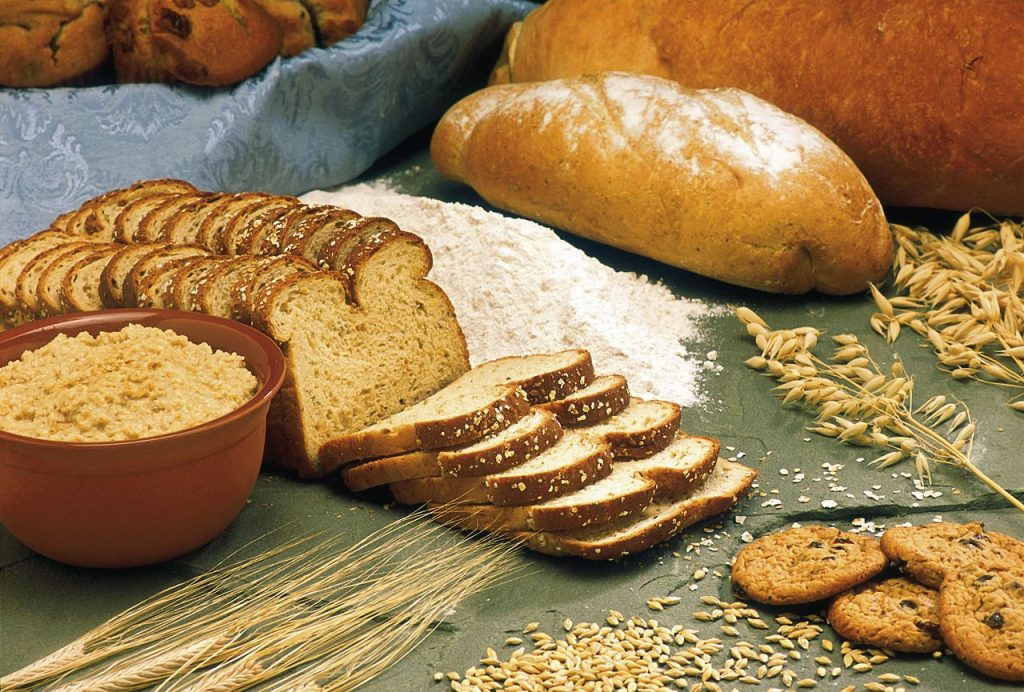Today there are a variety of diets in the world that help people’s bodies be healthier, more powerful, or more attractive. Not only sports players or fashion models, but also ordinary people follow those diets for their own purposes. Among those numerous diet methods, the gluten-free diet is one of the most popular for achieving overall good health. However, very few people know who pioneered gluten-free diets or how he did it.
It was almost a hundred years ago. Many people in a variety of countries were suffering from celiac disease, which is caused by gluten in one’s diet. However, the cause of the disease had not discovered yet, at that time. Therefore, patients with the disease had no choice but to follow the latest trend: dietary cures such as a banana diet or an oyster diet.1 Although those diets did not suggest that patients eliminate gluten from their meals, the diets were successful, because both bananas and oysters don’t have gluten, and they do have rich nutrients that is good for overall health. Bananas are still considered to be excellent fruits because they contain a lot of nutrients. And oysters do too.
First, oysters are high in zinc. Zinc plays an important role in various functions of the human body, and not having zinc can cause problems. For example, zinc is important for the immune system. It affects many kinds of cells, such as natural killer cells, which eliminate cancer cells and viral-infected cells. Zinc helps the cells to develop, which means that it contributes toward preventing people from getting sick. When the amount of zinc in the body is not enough, it can even cause death of cells.2 In addition, lack of zinc can cause growth retardation. In 1958, German professor Lothar Rink visited Shiraz, Iran and observed people who had dwarfism. The patients also had other symptoms, such as rough and dry skin, mental lethargy, and anemia. Rink and other researchers found their deficiency of iron. However, lacking iron could not explain their growth retardation. Then, they concluded that it could be because of a zinc deficiency. This was because the patients mainly ate breads made from whole wheat flour, which contained phytate, the element that prevents zinc from being absorbed.3 It is not only Iranians but also people all around the world who need to take more zinc. Oysters are one of the richest foods in this essential element, containing more than 10 mg of zinc per 100 g compared to salmon, chicken, or shrimp, which contain only 1-2 mg of zinc.4

Second, oysters can be a great source of protein. In China, they have been so valued as a protein source that sports beverages are made from them. One of the reasons is because the protein in oysters is easily absorbed in the human body. Most sports beverages sold in the current market are electrolytic. However, those beverages are difficult for the human body to absorb.5 Another benefit from oysters is that they have other components that are helpful for those who engage in sports. For example, oysters contain sugar and taurine. Sugar, like protein, is used in the body to provide energy quickly and effectively; taurine is good for relieving fatigue immediately after sports activity. Other effective components include bioactive peptide, glycogen, and saline ions.6 These components are necessary for athletes, which means that perfect sports beverages can be made from oysters. Also, at the time when oyster diets were trending, they were also providing an important energy source.
Although banana diets and oyster diets were thought to be the solutions for celiac disease, they were not reliable ways to prevent symptoms. Then, Willem Dicke, a Dutch pediatrician, started research in earnest. It took a lot of time and effort. After making examinations again and again, however, he found a clue, finally. Dicke found that many of the patients who eliminated wheat products from their diets felt better. He conducted further studies to make sure that wheat had something to do with celiac disease. In the end, he concluded that the cause of this disease is the existence of gluten.7 Since people did not have any knowledge of gluten at that time, it became a remarkable discovery. Even now, many people don’t know exactly what gluten is and how it affects celiac disease and people’s overall health.

Gluten is a protein in various foods. It helps dough to hold its shape or expand. It is contained in many of the foods we eat daily, such as breads, pasta, cereal, cakes, and cookies. This is because the primary source of gluten is wheat. Other sources of gluten include rye, barley, and European spelt.8 Although about 80 percent of wheat gluten is used in the baking industry in America, there are a lot of other gluten-containing foods, such as french fries or soups. Most cereals contain gluten; however, oats are still under investigation. A lot of researchers have conducted experiments with oats, but they have not yet been able to get definite answers. Further studies are needed to see whether oats are a gluten-containing cereal or not.9
Gluten is basically made up of two different kinds of protein components. One is gliadin and the other is glutenin, and gliadin is known to be harmful if it is not broken down in the body.10 The patients of celiac disease are not able to break down gliadin in their organs because of a reaction in the immune system. First, when taking gluten, bodies build up the immune system, which is mediated by an antibody called lgA. LgA attacks gastric mucosa and transglutaminase, the enzyme that dissolves gliadin. Then gliadin remains unbroken and causes various symptoms, such as skin rash, stomach pain, oral ulcers, and so on.11 The tolerable amount of gluten depends on each patient.12 Some study patients show comparatively slight symptoms, but others react more seriously, some so severe that it becomes a matter of life or death. Paul J. Ciclitira, a professor of gastroenterology, and other authors say in their book that “The importance of following a gluten-free diet by patients with celiac disease is protection against the increased risk of developing gastrointestinal malignancy, other autoimmune disorders, including diabetes mellitus and osteoporosis.”13 The recent survey by the National Board of Health, the National Institute of Diabetes and Digestive and Kidney Diseases reported that a third of adults in America feel negative effects after taking gluten, and 1 in 141 people there have celiac disease.14

After Dicke discovered the cause of celiac disease, he kept studying and then announced his findings. According to David Yan and Peter Holt in their article, Dicke made five conclusions: First, when patients are on a gluten-free diet, symptoms such as vomiting and anorexia disappear and the development of young patients’ bodies is encouraged. Second, patients have diarrhea when they eat wheat or rye foods. Third, patients have diarrhea when wheat flour is used in foods instead of rice or corn flour or potatoes. Fourth, when patients have wheat, the amount of fat in the feces increases. Fifth, wheat can cause harm but wheat starch does not.15 After Dicke announced his conclusions, many researchers began to study gluten for an improvement of medical knowledge. Therefore, his discovery of the relationship between gluten and celiac disease contributed to the knowledge that we have about it today. If he had not discovered them, people might have not known about gluten-free diets, such an effective method for making their physical conditions better.
- David Yan et. al., “Willem Dicke. Brilliant Clinical Observer and Translational Investigator. Discoverer of the Toxic Cause of Celiac Disease,” CTS: Clinical & Translational Science 2, no. 6 (2009): 446. ↵
- Lothar Rink, Zinc in Human Health (Washington, D.C.:IOS Press, 2011), 18. ↵
- Lothar Rink, Zinc in Human Health (Washington, D.C.:IOS Press, 2011), 8-9. ↵
- Lothar Rink, Zinc in Human Health (Washington, D.C.:IOS Press, 2011), 30. ↵
- Shi Hui, “The Development of Oyster Sports Beverage and Its Antifatigue Activity on Athletes After Training,” Carpathian Journal of Food Science & Technology 8, no. 1(2016): 48. ↵
- Shi Hui, “The Development of Oyster Sports Beverage and Its Antifatigue Activity on Athletes After Training,” Carpathian Journal of Food Science & Technology 8, no. 1(2016): 50. ↵
- David Yan et. al., “Willem Dicke. Brilliant Clinical Observer and Translational Investigator. Discoverer of the Toxic Cause of Celiac Disease,” CTS: Clinical & Translational Science 2, no. 6 (2009):446. ↵
- Salem Press Encyclopedia of Health, 2015, s.v. “Gluten,” by Joseph, Dewey, PhD. ↵
- United States International Trade Commission, Wheat Gluten (United States: U.S. International Trade Commission, 1998), II-5. ↵
- Salem Press Encyclopedia of Health, 2015, s.v. “Gluten,” by Joseph, Dewey, PhD. ↵
- Magill’s Medical Guide (Online Edition), 2013, s.v. “Gluten Intolerance,” by Nicole M Hoey, Pharm.D Van. ↵
- Paul J Ciclitira, et. al., “Gluten-Free Diet–What Is Toxic?,” Best Practice & Research. Clinical Gastroenterology 19, no. 3 (2005): 364. ↵
- Paul JCiclitira, et. al., “Gluten-Free Diet–What Is Toxic?,” Best Practice & Research. Clinical Gastroenterology 19, no. 3 (2005): 360. ↵
- Salem Press Encyclopedia of Health, 2015, s.v. “Gluten,” by Joseph, Dewey, PhD. ↵
- David Yan et. al., “Willem Dicke. Brilliant Clinical Observer and Translational Investigator. Discoverer of the Toxic Cause of Celiac Disease,” CTS: Clinical & Translational Science 2, no. 6 (2009): 447. ↵



49 comments
Celeste Flores
Before reading this I did not know what gluten was, however, I knew that it was somehow ‘bad’ for the body. I find it extremely interesting that no one knew about the existence of gluten. That just makes me wonder how many other damaging chemicals are we putting into our bodies and we do not know it yet. I should be more cautious with my gluten intake and any other foods that make me feel bad, maybe I am allergic to something and I do not know it yet.
Margaret Maguire
Before reading this article I had no idea that gluten was made out of two different proteins, Gliadin and Glutenin. But only one of the two proteins that gluten is made out of creates the symptoms of celeriac disease, gliadin. I also though it was interesting that 1 in 141 people have some sort of gluten intolerance. Oysters were a common diet that doctors would put people on in the past. Oysters contain a lot of zinc which I thought was really cool.
Brianna Ramos
If I’m completely honest I had no idea that gluten played a part in celiac disease and when people would tell me they had a gluten allergy, I would just think oh maybe it’s just a diet trend or fad. Learning the effects of gluten on certain people – vomiting, anorexia, diarrhea, and the increase of fat in their feces – it was insane to learn about. I didn’t realize that gluten had that extreme effect on the body. It’s crazy to think about though because gluten is in so many foods as a foundation ingredient or added in.
Rinnu Joy
I liked the tittle of the article because it draws the attraction of the audience very quickly as it did for me. This article was really informative. I didn’t know the benefits of oyster and banana other than it is good for us. Gluten or gluten-free has became a common word in our life but even then I don’t what it is. Thank you so much for the great information and congratulations for the great work and effort.
Gabriel Lopez
Before reading this, I didn’t know anything about what gluten was or why certain people have gluten free diets. It was interesting to learn about how much it can affect certain people and how it can potentially harm them after taking in a certain amount. Additionally, this article was very clear in explanation and easy to follow along, especially for someone like me who barely made it through biology. Congratulations on your publication, great article.
Courtney Pena
I found the title of this article interesting because many people in my family have a sensitivity to gluten so I wanted to know the background behind gluten sensitivities and gluten free diets. I thought that it was appealing how the dietary cure at the time was the banana and oyster diet and even though bananas and oysters do not contain gluten, it was not the best solution for people with celiac disease. I learned that gluten is made up of the proteins gliadin and glutenin and people with celiac disease cannot break down gliadin due to their immune system having a negative reaction to it. Thankfully there are now gluten free diets to help certain people out.
Luis Arroyos
The word gluten just sounds bad in itself. I have recently started watching my diet more carefully, but I never understood how unhealthy gluten was. In the past couple months, I have understood the pros in maintaining a healthy diet. Before reading the article, I didn’t realize how many foods actually contain gluten. Most of the things listed in the article are things I would normally eat without even questioning. As far as oysters go, I have never eaten any, but thanks to Sasahara’s article, I am officially trying them. I had never heard about how important zinc is in the human body. Informational articles like these are rarely pushed forward, and it is very important to be aware of what we are putting in our bodies. In order to achieve a healthy lifestyle, we must be educated on information such as this one. If we want to promote our overall health, information such as this one should be promoted more often.
Elizabeth Maguire
Before I read this article I did not know that oysters were high in zinc and that zinc is important for the immune system. I thought this article was very informational and interesting to me. Reading this article has really enlightened me on how gluten is really bad for one’s diet and why I should limit the intake of gluten.
Amariz Puerta
I honestly dont keep track of what I eat and now reading this I would really like to start limiting my gluten intake, I thought this article was interesting to me because I always choose to eat really bad. After reading this I now understand why people are gluten free now and why I think I should limit my gluten intake.
Ryan Estes
Before reading this article I had never even heard of celiac disease. Its fascinating that gluten plays such a large role in food groups and nutrition. The thing I found interesting about this article was the fact that oysters can be a great source of protein. I always thought proteins were just meats. I guess I’m just a little ignorant of the anatomy of oysters.